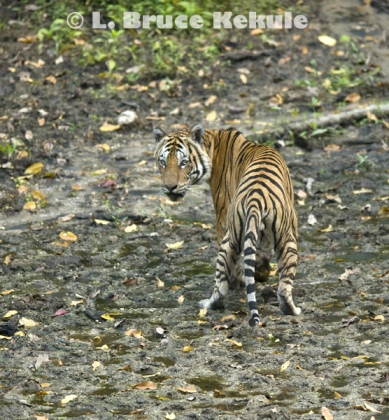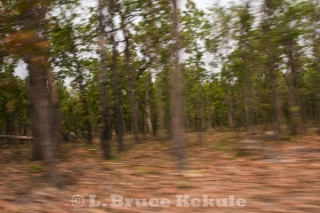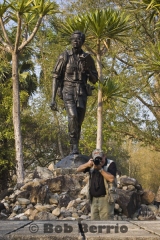Journey through a World Heritage Site: Part Six
Day 7: March 10th – Conclusion: World Heritage in jeopardy
Indochinese tiger at a mineral deposit
After all the dust had settled, I can look back at the situation in Huai Kha Khaeng Wildlife Sanctuary and honestly make an assessment of how and why this World Heritage Site is in jeopardy.
After hearing about three tigers (mother and her cubs) killed by poisoning, it seems poachers continue to enter this place and kill wild animals in the interior. A serious look at the ranger force and patrolling regimens, and the quality of protection is quickly needed before it is too late.
Deciduous forest abstract
For all the research going on in Huai Kha Khaeng, and the so-called smart patrols, how can poachers kill these rare cats? Other reports that wildlife snares and pipe-guns with trip wires are now found outside the headquarters area in Uthai Thani are alarming. These illegal hunters are slipping through the net so to speak due to too many loopholes in the patrolling and enforcement system.
In India several years ago, two national parks where researchers were working full-time had all their tigers exterminated in a year or so right under their noses. Good patrolling and enforcement is the only option when it comes to protected areas.
Deciduous flowers
Here in Thailand, most of the forest rangers are locals and hence there are not many secrets outside the sanctuary. There are 19 ranger stations that receive money amounting to 1,200 baht cash per patrol for food from the Wildlife Conservation Society (WCS) who also run the ranger-patrolling program. It would seem that food, clothing and equipment would be better than cash that can possibly go astray.
Approximately two times a month a patrol of five or six men spend a week walking the forests on designated trails. The poachers easily stay out of their way because they know the terrain and continue to do business as usual. It is said a bag of tiger bones now fetches more than a hundred thousand baht. Seems like a great incentive to break the law.
All patrols should originate at the headquarters and nobody knows where they are going or what trail they will take until they are already in the forest to keep leaks to a minimum. Patrol groups should be in the forest 24-7 and continue to revolve so that rangers are always out in the field.
Seub Nakhasathien monument
Without a doubt, new blood in the form of properly trained and sufficiently paid rangers using special-forces techniques is seriously needed in Huai Kha Khaeng and Thung Yai Naresuan next door. Enforcement and arrests of perpetrators should increase and outdated laws up-graded with severe fines and detention, especially for repeat offenders.
Another very important issue is life and health insurance for the rangers in case someone is injured or killed while on duty, and this should be standard for everyone, whether government officer, or permanent and temporary rangers. A central fund should be established for this and in case of a tragedy or accident; the family will be taken care of.
Protection of this World Heritage Site is a number one priority for the government, and everything else should be second. Over the long run, good management, patrolling and enforcement is the only option to save Thailand’s natural heritage for the future.




